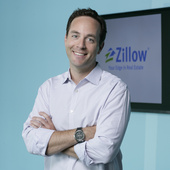I was paid a high compliment last week by one of the smartest people in our industry, Marc Davison, when he called me a “social CEO”. This caused me to ponder what it means to be a social CEO. Yes, it means that I participate in social media on Twitter , Facebook, Pinterest , Zillow Advice and of course on my two blogs. But it goes beyond that. It’s a state of mind. Being a social CEO means that I’m always accessible – to my employees, our advertisers, our business partners, and our users. I also create a culture at Zillow where all employees embrace being social, where the hundreds of employees at Zillow all view it as part of their job to be active online and promote our company through social media.
I was worried that when Zillow became publicly traded in July 2011, we might have to reduce our socialness. But I’ve worked hard to maintain a social culture even while being public. And it has been less difficult than I expected. True, there are plenty of topics that are off limits – financial results, forward-looking statements, and the like are all no-nos. But I’m always permitted to talk publicly about the company and our strategy, and to engage in discussion and debate about Zillow and the industry. I think CEOs that choose not to participate in social media by pleading “we're a public company” are being cop-outs. If they don’t want to use social media, that’s fine. But don’t blame the lawyers.
Examples of other CEOs who maintain an active social media profile are Jeff Weiner from LinkedIn, Marc Benioff from Salesforce, and Sherry Chris from Better Homes & Gardens. Ironically, Mark Zuckerberg isn’t what I’d call a “social CEO” because he doesn’t personally engage in social media to discuss his company.
It would be very interesting to see how shareholder value creation is correlated with social media participation on the part of employees and executives. It would be pretty easy to use the number of tweets as a proxy for social media involvement. Some economics grad student out there should do a dissertation on this. If you see any research on it, please let me know. Until then, see you around the internet.





Comments(1)